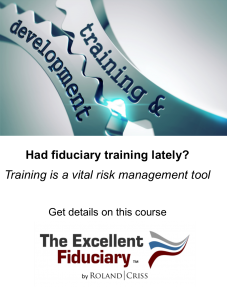Article
How do employee benefit plan fiduciaries get that job?
If you aspire for an appointment to serve on your employer’s committee that oversees its retirement, pension, and health plans, you are in a select company. In our experience as a risk management advisor to employee benefit plans, our surveys reveal that few managers and executives who serve on these committees sought their appointment.
But let’s say that you are appropriately ambitious and would enjoy cracking the circle of an elite group of managers by gaining assignment to your enterprise’s fiduciary committee. What do you need to know?

Understand the Risk
Do not overlook the reality that U.S. civil law imputes the severest level of potential liability on people who are fiduciaries. For that reason, decisions made in a committee room have personal risk implications for all the members. Your employer cannot indemnify you from legal exposure.
If a lawsuit alleges that your organization breached its ERISA fiduciary duty, one or more fiduciary committee members will likely become defendants. If caught in such a situation, an employer’s lawyer cannot represent the members, and they’ll need to get their own lawyers.
Suppose the committee you aspire to join can’t demonstrate conformance to a decision-making framework developed on ERISA standards. Due to the severity of the personal legal risk you would face, it might be best to decline the opportunity, no matter how altruistic or career-minded you may be.
Examine the Required Skill Sets
The skills needed to serve safely and competently as a fiduciary under the Employee Retirement Income Security Act (“ERISA”) are not intuitive. They are acquired.
Yet most individuals who populate ERISA plan committees have little fiduciary training, and most have no training at all. That allows service providers, whose marketing strategies often conflict with a committee’s duty, to have an improper effect on ERISA committees’ evaluation and decision-making practices.
Vendors have the legal freedom and an economic incentive to distort outcomes in their own favor, and many do so. Scores of employers and committee members are learning the hard way their vendors’ claims of fiduciary assurance have little value as an alarming pace of class action lawsuits targeting the executive class, not the vendors, continues unabated.
The traits of an excellent fiduciary develop from two categories of skills or disciplines, and we’ll refer to them as process management skills and technical skills.
Manage for Process, Not Outcomes
The standard by which the U.S. Department of Labor (“DOL”), the IRS, and the courts determine if an employer and its fiduciaries conducted themselves appropriately is abundantly clear. That standard concerns itself with a committee’s process for managing its ERISA plans.
ERISA’s demand for process quality is not unique. For example, thousands of businesses that rely on suppliers for critical products and services require certain subcontractors to show certification with ISO 9001, an international quality management standard.
Unfortunately, no certification exists that proves an employer’s conformance to ERISA’s standard. That leaves many committees not knowing if their management methods are appropriate, finding out only in a courtroom or after a regulator has found them in violation of their duty.
Committees can easily focus primarily on the results of decisions. Investments is a good example. Many committees concentrate their time inappropriately discussing the performance of the funds among their plans’ investment options, falsely believing they must pick “winners.” Proving that the consequences of investment decisions emerged from a carefully considered procedure is far more important than the outcomes. The only haven for fiduciaries is a comprehensive quality management process covering the entire scope of disciplines embedded in ERISA’s fiduciary standards of care.
Technical Skills Required for the Role
The DOL declares, “The primary responsibility of fiduciaries is to run the plan solely in the interest of participants and beneficiaries and provide benefits and pay plan expenses.“
In order to fulfill that mandate, an understanding of a plan’s governance provisions (i.e., the plan design), investment industry jargon and options, service providers’ fee structures and how they receive income, and a cybersecurity workflow that includes collaboration with the Information Technology team.
An Opportunity to Serve Others
If you are willing to obtain training in a new set of disciplines, enjoy the prospect of helping your fellow employees achieve the best retirement and health plans possible, are concerned about the security and protection of plan data and assets, and are prepared to accept legal liability for your decisions, the fiduciary role will fulfill those ambitions. But measure your aims carefully.
Look Before You Leap
Suppose the committee you aspire to join can’t demonstrate conformance to a decision-making framework developed on ERISA standards. Due to the severity of the personal legal risk you would face, it might be best to decline the opportunity, no matter how altruistic or career-minded you may be.
If you’re already a member of a committee that lacks a quality management system that meets ERISA’s requirements, don’t delay adopting one.
Roland|Criss tailors a comprehensive framework we built around ERISA’s standards for fiduciary committees.




